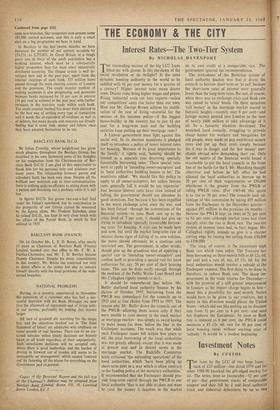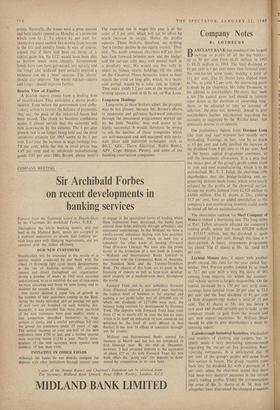Investment Notes
By CUSTOS
Teach issue by the LCC of two huge loans - - I each of £25 million—one dated 1974 and the other 1988-90 knocked the gilt-edged market for six. The terms were so favourable---61 per cent at par—that government stocks of comparable coupon and date fell by J and local authority stock and industrial debentures by up to two points. Naturally, the issues were a great success and both stocks opened on Monday at a premium which rose to 2. To obtain 61 per cent for twenty-five years seemed like manna from heaven to the life and annuity funds. It was, of course, argued that if there had been no threat of a capital gains tax, the LCC would have been able to borrow much more cheaply. Government bonds have now been galvanised into activ;ty and the 'longs' and 'undated' have actually enjoyed a technical rise on a 'bears squeeze. The 'shorts' should also improve. The whole market—shorts and longs—should improve further.
Bearish View of Equities A bearish report comes from a leading firm of stockbrokers. They anticipate a severe profits squeeze. Even before the government took defla- tionary action'to correct the balance of payments, they say, the peak of the industrial boom had been passed. The shock to business confidence makes it almost certain that the economy will turn downwards by the autumn. The 4 per cent growth rate is no longer being held and the most optimistic estimate for 1965 seems to be 1 per cent. Last year the increase in wage earnings was 7.8 per cent, while the rise in retail prices was 4.45 per cent and in wholesale manufactured goods 3.03 per cent. (Mr. Brown, please note!)
The expected rise in wages this year is of the order of 6 per cent, which will not be offset by much increase in output. Hence the profits squeeze. These brokers, therefore, see nothing 'but a further decline in the equity market.' They end : No doubt company chairmen will put their best foot forward between now and the budget and the current rally may well extend itself in a desultory way. We would use this rally in order to reduce equity holdings till the yield on the Financial Thnes-Actuaries index at least equals the yield on long gilts, which, in a reces- sion period, would be a safer rule to follow.' That index yields 5.2 per cent at the moment of writing against a yield of £6 8s. 6d. on War Loan.
Long-term Holdings
Long-term, as these brokers admit, the prospect may be less gloomy, because Mr. Brown's efforts to modernise and galvanise backward industries through the investment programmes worked out by the little 'Neddies' may well prove to be highly successful. It would, therefore, be wrong to sell the equities of those companies which are well-managed and well-equipped with up-to- date plant and industrial techniques such as BICC, GEC, Thorn Electrical, Radio Rental, APV, Cope Allman, Plessey; and some of the building construction companies.







































 Previous page
Previous page